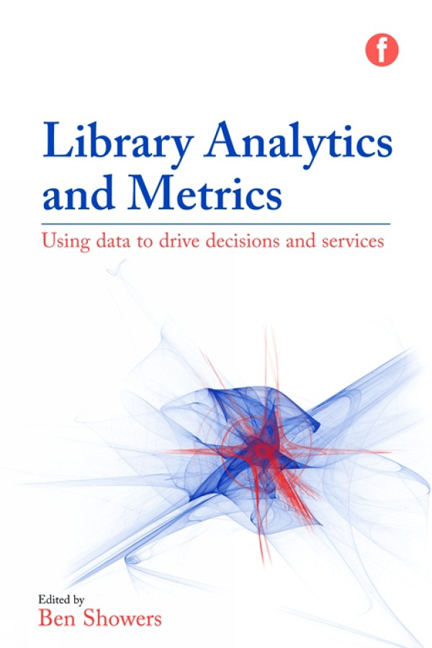Book contents
- Frontmatter
- Dedication
- Contents
- List of figures and tables
- Contributors
- Acknowledgements
- Introduction: getting the measure of analytics and metrics
- 1 Library data: big and small
- 2 Data-driven collections management
- 3 Using data to demonstrate library impact and value
- 4 Going beyond the numbers: using qualitative research to transform the library user's experience
- 5 Web and social media metrics for the cultural heritage sector
- 6 Understanding and managing the risks of analytics
- 7 Conclusion: towards a data-driven future?
- Index
3 - Using data to demonstrate library impact and value
Published online by Cambridge University Press: 09 June 2018
- Frontmatter
- Dedication
- Contents
- List of figures and tables
- Contributors
- Acknowledgements
- Introduction: getting the measure of analytics and metrics
- 1 Library data: big and small
- 2 Data-driven collections management
- 3 Using data to demonstrate library impact and value
- 4 Going beyond the numbers: using qualitative research to transform the library user's experience
- 5 Web and social media metrics for the cultural heritage sector
- 6 Understanding and managing the risks of analytics
- 7 Conclusion: towards a data-driven future?
- Index
Summary
Chapter overview
Libraries, and cultural heritage institutions more generally, are increasingly being asked to demonstrate their value and impact. This chapter aims to provide an insight into how libraries are gathering and analysing data both locally and from across external, enterprise systems to demonstrate the value that they bring to the wider life of the institution and the success of its students and researchers. The chapter focuses on the work of three university libraries that are leading the way in demonstrating their impact in the lives of the students and other users of their services. The three case studies from the UK, US and Australia provide an insight both into what the data reveals and on the approaches they took to gather and analyse the data. They also highlight the technical, cultural and ethical challenges that the libraries faced in bringing this data together, and how they each overcame these barriers to change the way in which the library is viewed within the wider organization.
The three international case studies are:
• CASE STUDY 3.1 Stone, G., Library impact data: investigating library use and student attainment (University of Huddersfield), p. 51
• CASE STUDY 3.2 Nackerud, S., Fransen, J., Peterson, K. and Mastel, K., Retention, student success and academic engagement at Minnesota (University of Minnesota), p. 58
• CASE STUDY 3.3 Cox, B. and Jantti, M., The Library Cube: revealing the impact of library use on student performance (University of Wollongong), p. 66
Does library use have an impact on student success?
In 1968 Lloyd and Martha Kramer (Kramer and Kramer, 1968, 310) asked an apparently straightforward question: Does a student's use of the college library have a relationship to the likelihood of that student completing her course and graduating?
Such a question appears somewhat unnecessary. Of course it does – doesn't it?
As it happens, the Kramer paper suggests that there is a statistically significant correlation between library use and ‘student persistence’. But, more importantly, the Kramers’ and a small handful of other early studies (such as Barkey, 1965, who explored the impact of the library on a student's grade point average), had wanted to provide evidence to back up the intuitive responses such questions usually inspire.
Information
- Type
- Chapter
- Information
- Library Analytics and MetricsUsing Data to Drive Decisions and Services, pp. 47 - 78Publisher: FacetPrint publication year: 2015
